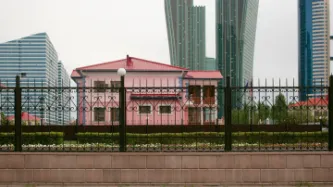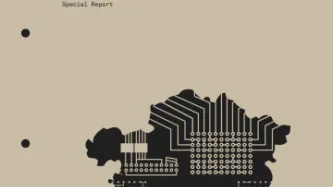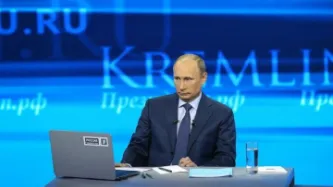Search
Content type: Examples
A report finds that most of the education technology endorsed by 49 governments in the rush to online learning during the covid-19 pandemic puts at risk or directly violates the privacy and rights of children for purposes unrelated to their education. Such platforms track children across the internet, access their contacts lists on social media and phones, and built profiles that can be used for manipulation.
https://www.hrw.org/report/2022/05/25/how-dare-they-peep-my-private-life/childrens-…
Content type: Examples
The pro-Ukrainian hacker group NLB Team leaked the personal data of more than 17 million children and parents who used Moscow Electronic School, an online learning platform that was built by the Moscow city government in 2016 and was its primary method of delivery online education during the covid-19 pandemic. The city government said the leaked data did not pertain to real users; however, a number of users identified their own data. Even before the leak, the platform was reportedly surveilling…
Content type: Examples
Ukraine and Russia are both weaponising facial recognition - but Russia is using it to hunt down anti-war protesters, holding and sometimes torturing anyone who refuses to be photographed, while Ukraine is using software donated by Clearview AI to help find Russian infiltrators at checkpoints, identify the dead and reunite families. Russia's widespread surveillance means that activists can be followed and arrested anywhere. In an approved, peaceful anti-government rally in Moscow in 2019,…
Content type: Examples
Footage captured by Bloomberg shows that police are arresting anti-war protesters in Russia and scrolling through their phones.
https://www.bloomberg.com/news/videos/2022-03-07/russian-police-search-protesters-phones-make-arrests-video
Writer: Kommersant
Publication: Bloomberg TV
Publication date: 2022-03-07
Content type: Examples
Based on a draft methodology from Russia's Emergency Situations Ministry, Kommersant business daily reports that Rostec's data subsidiary, Natsionalny Tsentr Informatizatsii, is developing software that will use machine learning to detect and prevent mass unrest. The software will analyse news reports, social media postings, public transport data, and video surveillance footage; if it fails to prevent mass unrest it is expected to direct the crowd's movements to stop it from escalating. The…
Content type: Examples
The Kommersant reports that Russia's Rostec State Corporation is developing a new AI-powered anti-riot surveillance system that uses biometrics-powered cameras and can search social media networks and other publicly accessible data and intends to deploy the new system by the end of 2022. The behaviou analysis software is being developed as part of the Safe City project under the aegis of the Ministry of Emergency Situations, which intends to spend 97 billion rubles ($1.3 billion) deploying Safe…
Content type: Examples
Russian authorities are using facial recognition to track opposition protesters to their homes and arrest them, though the cameras are often turned off or "malfunctioning" when state security agents are suspected of attacks on or murders of journalists and opposition activists. The data is gathered into a central database and is sold cheaply by corrupt officials on Russia's "probiv" black market in data. Facial recognition software, produced by local companies such as NtechLab, is…
Content type: Examples
Thousands of Muscovites ordered to download a hastily-developed app to enforce their quarantine report that they have been wrongly geolocated and fined and that the app has trapped them into compliance criteria that are impossible to meet. The app, which demands an exceptionally broad range of permission and stores the data on Moscow’s servers for a year, is compulsory for everyone with respiratory disease symptoms. Officials say it has helped keep the city’s death rate as low as 3.8%. Some…
Content type: Examples
Russian authorities are considering introducing an app that migrant workers will be required to download when they enter the country. Leaked details indicate that the app would contain detailed biometric data, health status, police records, and a “social trustworthiness” rating. It’s unclear whether the app would access other data such as geolocation and user content. Other aspects of surveillance are also expanding in Russia, such as using Moscow’s surveillance camera system to track those…
Content type: Examples
The city of Moscow is planning to use smartphone geolocation functions to track foreign tourists' movements through the city to prevent outbreaks of COVID-19 after Russia reopens its borders. Moscow accounts for two-thirds of all cases in the country. Moscow City Hall is considering a system that would provide daily updates on tourists' movements using their SIM card data and show when residents come into contact with them; it is already buying location data from Russia's three biggest telecom…
Content type: Examples
The Kazakhstani ministry of health requires the 8,000 or so Kazakhstani citizens currently under quarantine to use the SmartAstana tracking app, which enables officials to ensure that they remain in isolation. By contrast, for the city of Almaty the ministry of the interior relies on video surveillance technology called Sergek, produced by the local telecommunications firm Korkem Telecom to find people who break quarantine . So far, these two cases are the only examples of the government…
Content type: Examples
Russian prime minister Mikhail Mishustin has ordered the country's Communications Ministry to develop a system, to be built on analysing specific individuals' geolocation data from telecommunications companies that can track people who have come into contact with those who have tested positive for the novel coronavirus. The data will also be passed to regional-level task forces fighting the virus's spread; officials are also tasked with finding a way to notify those who may have come into…
Content type: Examples
Russia has set up a coronavirus information centre to to monitor social media for misinformation about the coronavirus and spot empty supermarket shelves using a combination of surveillance cameras and AI. The centre also has a database of contacts and places of work for 95% of those under mandatory quarantine after returning from countries where the virus is active. Sherbank, Russia's biggest bank, has agreed to pay for a free app that will provide free telemedicine consultations.
Source:…
Content type: Examples
A document awaiting approval from the federal authorities outlines the measures Russia may need to adopt in the event of a widespread COVID-19 outbreak. In "emergency mode". The proposal's Plan A allows for cancelling all international sports, cultural, scientific, and social events in Moscow; surveillance of those who test positive along with tracing their contacts from video surveillance camera records and geolocation data as well as disinfection of their home and everywhere they and their…
Content type: Examples
Russian authorities are using surveillance cameras, facial recognition systems, and geolocation to enforce a two-week quarantine regime affecting 2,500 people. Chinese citizens are banned from entering Russia; Russians and citizens of other countries who arrive from China are required to go through two weeks of quarantine. Police raid hotels to find Chinese citizens who arrived before border controls began, and bus drivers have been ordered to call their dispatchers if they see Chinese citizens…
Content type: Examples
In February 2019, after investigative journalists used social media posts to investigate the country's hidden role in conflicts such as those in Ukraine and Syria, Russia began moving to ban its soldiers from posting any information that would expose their whereabouts or their role in the military. The ban would include photographs, video, geolocation data, and other information, and prohibit soldiers from sharing information about other soldiers and their relatives.
https://www.reuters.com/…
Content type: News & Analysis
While people may think that providing their photos and data is a small price to pay for the entertainment FaceApp offers, the app raises concerns about privacy, manipulation, and data exploitation—although these concerns are not necessarily unique to FaceApp.According to FaceApp's terms of use and privacy policy, people are giving FaceApp "a perpetual, irrevocable, nonexclusive, royalty-free, worldwide, fully-paid, transferable sub-licensable license" to use or publish the…
Content type: Advocacy
Privacy International has today sent letters to leading social media platforms to ask what they're doing to protect their users' from dangerous surveillance by government immigration authorities.
The letter comes following the implementation of plans by US authorities to require nearly all visa applicants to hand over identifiers of all social media accounts they have used in the previous five years, or face “serious immigration consequences”.
The move not only represents…
Content type: Press release
Privacy International (PI) has today urged England Manager Gareth Southgate to bolster his defence ahead of the World Cup in Russia, which kicks off next Thursday. PI sent Southgate an anti-surveillance 'Faraday cage' phone pouch and a briefing on his vulnerability to potential spying by rival football managers and foreign governments intent on giving their team a competitive advantage. If rival governments routinely hack and intercept each other's communications, what's stopping rival teams'…
Content type: News & Analysis
The following op-ed appeared in openDemocracy, written by Edin Omanovic, Research Officer at Privacy International:
It's not surprising that some of the states in Central Asia spy on people. Authoritarianism across the world relies on the intrusion into, and lack thereof, of a private sphere. From the KGB to their modern incarnations, the autocracies in the region continue to rely on state surveillance and other entrenched means of political control to stay in power.
New technologies and…
Content type: News & Analysis
Sometimes it takes an unexpected stranger to remind you what you have, and what you are at risk of losing. Roman Zakharov, a Russian publisher who challenged Russia’s surveillance legislation, is that stranger for many Brits and Europeans. The Grand Chamber of the European Court of Human Rights judgement on Friday 4 December 2015 was remarkable, not because it tore up the rule book on the jurisprudence surrounding state surveillance in the Council of Europe, but because it followed…
Content type: News & Analysis
15 January 2015
The following op-ed appeared in openDemocracy, written by Edin Omanovic, Research Officer at Privacy International:
It's not surprising that some of the states in Central Asia spy on people. Authoritarianism across the world relies on the intrusion into, and lack thereof, of a private sphere. From the KGB to their modern incarnations, the autocracies in the region continue to rely on state surveillance and other entrenched means of political control to stay in power.
New…
Content type: Press release
Governments across Central Asia have deployed advanced surveillance systems, including monitoring centres capable of spying on an entire country's communications, according to a new investigative report published today by Privacy International.
The comprehensive report, “Private Interests: Monitoring Central Asia”, contains personal accounts taken by Privacy International detailing how Central Asian governments use electronic surveillance technology to spy on activists and…
Content type: News & Analysis
Privacy international is proud to release “Private Interests: Monitoring Central Asia”, a 96-page report detailing its findings from an extensive investigation into electronic surveillance technologies in Kazakhstan, Kyrgyzstan, Tajikistan, Turkmenistan, and Uzbekistan.
The report brings together the findings of PI's team of investigative researchers, consultants, and technical, legal and policy experts, and is the outcome of consultations with confidential sources, regional experts,…
Content type: Report
“Private Interests: Monitoring Central Asia” is a 96-page report detailing its findings from an extensive investigation into electronic surveillance technologies in Kazakhstan, Kyrgyzstan, Tajikistan, Turkmenistan, and Uzbekistan.
The report brings together the findings of PI's team of investigative researchers, consultants, and technical, legal and policy experts, and is the outcome of consultations with confidential sources, regional experts, individuals who have been targeted by…
Content type: News & Analysis
This is a excerpt from a piece, written by Privacy International partners Andrei Soldatov and Irina Borogan, which appears in the Fall issue of the World Policy Journal:
In March 2013, the Bureau of Diplomatic Security at the U.S. State Department issued a warning for Americans wanting to come to the Winter Olympics in Sochi, Russia next February: Beware of SORM. The System of Operative-Investigative Measures, or SORM, is Russia’s national system of lawful interception of all…
Content type: News & Analysis
A longer version of this article was previously published in Wired on 10 May 2013.
We all know surveillance is big in Putin’s Russia. What you may not know is that Russia’s surveillance tech is being used all over the world, even in the U.S.
The Kremlin is up to its domes in spy technology. One reason is fear, provoked by the Arab Spring, of a growing and diffuse protest movement that uses social media to organize. Notably, the authorities have taken an interest in DPI (…
Content type: News & Analysis
In order to lawfully conduct communications surveillance (“lawful interception”) in the U.S. and Western Europe, a law enforcement agency must seek authorisation from a court and produce an order to a network operator or internet service provider, which is then obliged to intercept and then to deliver the requested information. In contrast, Russian Federal Security Service operatives (FSB) can conduct surveillance directly by utilising lawful interception equipment called SORM.
SORM
SORM is…
Content type: News & Analysis
On November 12, the Russian Supreme Court okayed the wiretapping of an opposition activist. The Court ruled that spying on Maxim Petlin, a regional opposition leader in Yekaterinburg, was lawful, since he had taken part in rallies where calls against extending the powers of Russia’s security services were heard. The court decided that these were demands for “extremist actions” and approved surveillance carried out by the national interception system, known as SORM.
Manned by the…










